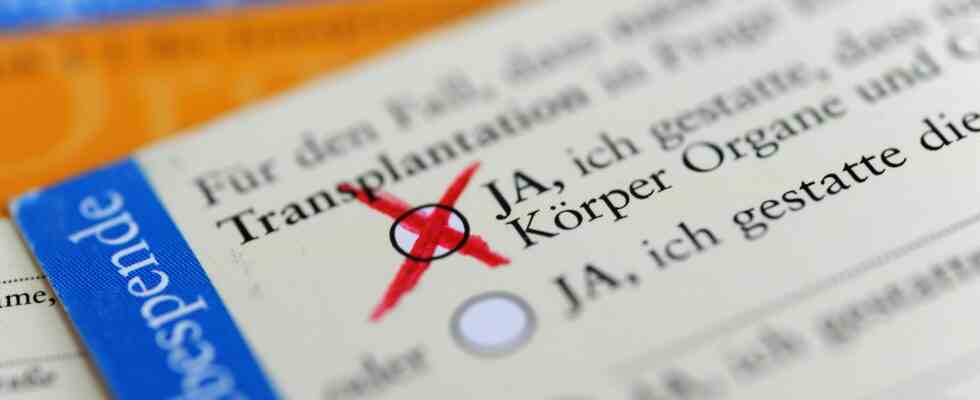Status: 04.06.2022 2:54 p.m
Far too few people are organ donors – that is well known. There should have been a donation register for a long time, but there is a problem. And would it even help against the shortage?
Sandra Zumpfe knows what it feels like to wait for a donor organ. Due to a genetic defect, she needed a new heart in her early 30s. She was put on the waiting list, and a trying time began. She had to be available 24/7, not knowing if the life-saving call would ever come. Things went well for Sandra Zumpfe: After six months, the call came just before midnight, and less than half an hour later the ambulance was at the door to take her to the clinic for a heart transplant.
The uncertainty of whether a donor will be found in time is currently experienced by around 8,500 people in Germany. For some on the waiting list, the call will not come in time. Last year, 933 people donated one or more organs after their death. An online register should help to increase the number. As with the organ donor card, only digitally, everyone should be able to register and declare whether they are willing to donate their organs. The hospitals should be able to access the data more quickly without having to search for documents for a long time.
Problems with the software?
Actually, the organ donation register was supposed to start in March. But in February, the Federal Ministry of Health announced that nothing would come of it, that the clinics were already under too much strain due to the pandemic. Gerald Gass, chairman of the German Hospital Association, counters that the clinics are ready. It is up to the federal authority responsible for the online register. Accordingly, there are problems with the software used to retrieve the data – and it will be delayed beyond 2022. And even if it then brings a certain amount of relief to everyday life, Gass doubts that the online register will fundamentally change anything: “I’m skeptical as to whether we’ll win significantly more people who declare their willingness to donate.”
Corona as an excuse?
The government is not making enough effort to keep the organ donation register, criticizes the opposition: “I think Corona is also often used as an excuse for political failures,” says Tino Sorge, the Union’s health policy spokesman. The Federal Ministry of Health must clarify where the problems lie and then solve them as quickly as possible. The CDU politician thinks it would be far too late if the online register only started in 2023.
Health Minister Karl Lauterbach sees technical problems and the corona pandemic as two reasons for the delay. But the real evil for him lies deeper: the decline in organ donations. For the first quarter of this year, the German Foundation for Organ Transplantation (DSO) reported a massive slump in organ donations: the number of organ donors fell by 29 percent compared to the same period last year. The DSO attributes this to the corona pandemic, among other things.
Lauterbach wants a contradiction solution
SPD Minister Lauterbach says: “The donations are falling because the willingness to donate is there – but it is not registered.” A contradiction solution would fix that, he said ARD Capital Studio. So Lauterbach wants a new approach to regulate organ donation differently. He had already failed once in the Bundestag.
It was not until January 2020 that the members of parliament dealt intensively with the topic and discussed various proposals in an orientation debate. A new law was passed to strengthen the willingness to make decisions about organ donation. One of the draft laws that Lauterbach helped introduce provided for an opt-out solution: Anyone who does not object during their lifetime would automatically be a potential organ donor.
But there was no majority in the Bundestag for this, instead the extended consent solution was adopted: As before, the consent of the potential organ or tissue donor is a prerequisite. If someone has not submitted a declaration, the next of kin can decide whether an organ donation is possible. Since March, general practitioners have also been supposed to provide regular advice, and federal and state identification offices have been supposed to hand out educational material and organ donor cards.
“We’ve tried a lot now, but it didn’t really work out,” says Lauterbach: “In my opinion, we absolutely need a new attempt to resolve the contradiction.” Otherwise the problem would not be solved.
Just a register does not help against the shortage
Even the German Hospital Society does not believe in a breakthrough through the online register. Because people still have to actively deal with the question of whether they want to donate organs or not. From the point of view of the chairman of the hospital society, Gerald Gass, the contradiction solution would help.
A survey by the Federal Center for Health Education suggests that more people could donate organs: More than 80 percent of Germans have a positive attitude towards organ donation – but only half of them have put it down in writing.
But in order to regulate organ donation again, the Bundestag has to start the debate from two and a half years ago again from the beginning. Minister Lauterbach calls on the MPs to do this: He believes that this time there could be a majority for the contradiction solution. Parliament must answer this ethical question.


